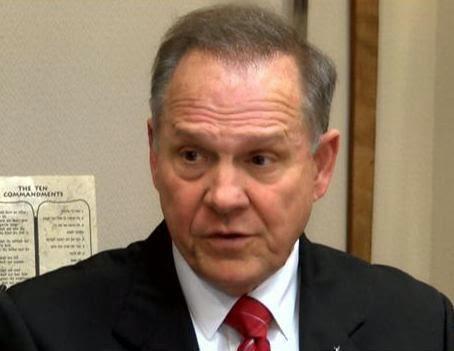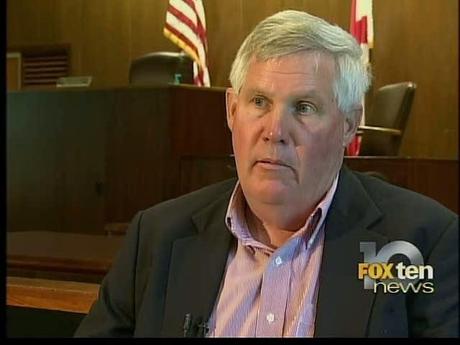
Roy Moore
Chief Justice Roy Moore is one of the most famous judges in Alabama history for a reason--he is notorious for challenging federal authority on certain hot-button social issues. Moore might have the loudest such voice among Alabama jurists, but he is far from alone in holding the mindset that federally authority doesn't mean much in Alabama courtrooms.Few were surprised Sunday evening when Moore essentially instructed Alabama probate judges to "secede from the union" by ignoring a federal-court order that struck down the state's gay-marriage ban. The U.S. Supreme Court refused to take action that might have kept a stay in place, so same-sex couples were able to marry yesterday at several locations around the state.
That made international news and touched off celebrations among the progressive minority in a deeply conservative state. As for us, we are happy for the newlyweds and applaud the probate judges who ignored Moore and did the right and lawful thing. But celebrations might be short lived--and that's because Alabama courts remain places where "federally guaranteed" constitutional rights often go to die.
Just consider my own experience. On October 23, 2013, I was arrested and spent five months in jail because of a defamation lawsuit that Republican political figure Rob Riley filed. Riley sought a temporary restraining order (TRO) and preliminary injunction, forbidding me from reporting certain information that had never been found to be false and defamatory at trial.
Retired Alabama judge Claud Neilson granted both of Riley's requests, even though they were classic prior restraints, which have been prohibited under 230 years of First Amendment law, predating the end of the Revolutionary War. A prior restraint forbids speech before there has been a finding at trial that it is unlawful.
The foundational 20th-century case on the subject is Near v. Minnesota (1931), in which the U.S. Supreme Court declared that prior restraints form "the essence of censorship." In my one court hearing in the Riley case--there never was anything approaching a trial--I cited Near to show that the TRO, preliminary injunction, and my subsequent incarceration were unlawful. Nielson acknowledged being familiar with Near, but he refused to follow black-letter U.S. law.
Neilson ordered that I remain incarcerated until certain items were removed from my blog. When I noted that I was in jail, with no computer or internet access and no way to "cure" any alleged contempt of court, Neilson essentially told me that was my problem. I wasn't released until my wife was able to remove those items on March 26, 2014. Without that, I probably would still be in jail, without bond, as the first journalist to be incarcerated in the United States since 2006--and the only one this century to be arrested in a civil matter.

Claud Neilson
Where do my story and the gay-marriage story intersect? Many of the same-sex couples who got married yesterday in Alabama are likely to wind up back in a courthouse someday. Even if they strive to lead the noblest of lives, some issue (divorce, estates/wills, real estate, car accident, etc.) is likely to bring them back to court.When those days come, can they expect to be treated lawfully? Based on my experience, and the experiences of dozens of Alabamians I've written about on this blog, the answer is no.
That's because too many judges like Claud Neilson feel free to ignore binding U.S. Supreme Court precedent. Too many judges like Claud Neilson feel free to ignore the 14th Amendment rights to due process and equal protection under the law. Writing this blog has taught me that "Claud Neilsons" butcher the law in numerous Alabama counties, from one end of the state to the other.
Here is another reason yesterday's celebrants should keep a wary eye: Claud Neilson is from Demopolis in Marengo County and was dragged out of retirement to handle my case in Shelby County, apparently because judges in my area had recused themselves.
Who assigned Neilson to my case, even before I was aware there was a case, before I had been (unlawfully) served, before a court could even begin to claim jurisdiction over me? The Alabama Supreme Court did it, under Chief Justice Roy Moore.
Has Roy Moore shown any sign of being concerned about the gross violations of my civil rights? Not that I'm aware of. Is Moore likely to someday show contrition about his actions on the gay-marriage issue? You know what they say about snowballs and hell . . .
Despite yesterday's signs of progress, Alabama courts remain filled with judges like Roy Moore and Claud Neilson. Change comes slowly in the Deep South--and some things never seem to change at all.
